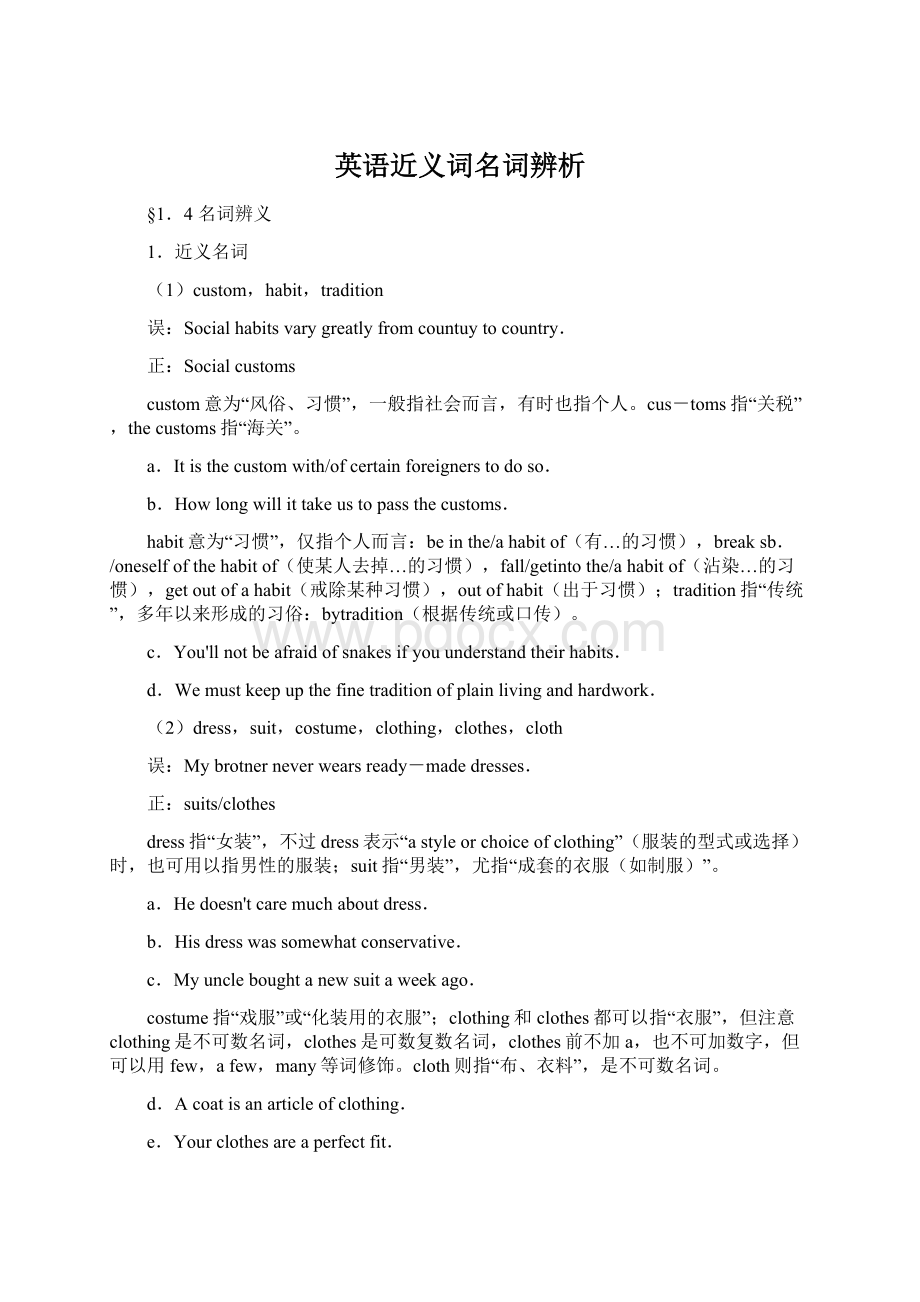英语近义词名词辨析Word文档格式.docx
《英语近义词名词辨析Word文档格式.docx》由会员分享,可在线阅读,更多相关《英语近义词名词辨析Word文档格式.docx(31页珍藏版)》请在冰豆网上搜索。

b.Hisdresswassomewhatconservative.
c.Myuncleboughtanewsuitaweekago.
costume指“戏服”或“化装用的衣服”;
clothing和clothes都可以指“衣服”,但注意clothing是不可数名词,clothes是可数复数名词,clothes前不加a,也不可加数字,但可以用few,afew,many等词修饰。
cloth则指“布、衣料”,是不可数名词。
d.Acoatisanarticleofclothing.
e.Yourclothesareaperfectfit.
男子穿大礼服是infulldress,晚礼服是eveningdress。
只可说anarticle/apieceofclothing(一件衣服),asuitofclothes(一套衣服),不可以说anarticleofclothes,asuitofclothing。
(3)skin,complexion,leather
Lookatherrosycheeks,shehasalovelyskin.
complexion
skin意为“皮、皮肤”,beinsb.'
sskin(处于某人的地位);
complex-ion意为“肤色、面色、气色”;
leather表示“皮革”,不可指人或动物。
a.Hewearshissweaternexttotheskin.
b.Iwouldn'
tbeinyourskin.
c.Shehasahighcomplexionaftertwoyearsexercise.
d.Thissuitismadeofleather.
(4)scene,scenery
Taxisandbuseswerepartofthestreetscenry.
scene
scene是可数名词,指“风景、布景、场面、景象”,既可指动的场面,也可指不动的风景,achangeofscene(改换环境),behindthescenes(在后台、在幕后),comeonthescene(出现);
scenery是不可数名词,一般指“自然风景”。
a.Thepicturepresentsthebleak,bare,greyishsceneofaFebruarymorning.
b.Theseatofthepuppetgovernmentwasthesceneofangrydemon-strations.
c.Intheindustrialarea,thereisnoscenerytospeakof.
(5)sample,example
Thenursetookanexampleofmyblood.
asample
sample意为“抽样(化验等用)、货样”,beuptosample(货物符合样品规格);
example意为“例子、例句或榜样”,beyondexample(没有先例),forexample(例如),withoutexample(没有先例),set/giveagoodexampletosb.(为某人树立了好榜样),makeanexampleofsb.(惩一儆百)。
ThisisanexampleofearlyChinesearchitecture.
(6)country,state,nation
Somepartsofthestatearemuchwarmerthanothers.
country
这三个词都可指国家,但含义不同。
country指国家时,着重指“国土”,也可指具有某种地理特点的区域或地区。
thecountry意为“(总称)国民、选民、乡下、农村”;
nation着重指“民族、人民”;
state着重指“政体”。
a.Chinaisagreatsocialistcountry.
b.Itwasunknown/strangecountrytome.
c.TheChinesenationstruggledfortheindependenceandliberationundertheleaderofC.P.C..
d.Chinaisasocialiststate.
(7)produce,product
Ourcarisaproduceofthatfactory.
product
produce是不可数名词,它仅指“农产品”;
product是可数名词,既可指“农产品”,也可指“工业产品”。
a.I'
llbringyousomeproducewhenIcomeback.
b.Theysellalotofindustrialandagriculturalproductstocustomers.
(8)error,mistake
Herepentedthemistakesofhisyouth.
errors
mistake和error常可互相换用,但是,error可指道德方面的过失,而mistake则不能。
另外,在下列固定搭配中,两词不可换用:
anerrorofjudgement,inerrors,bymistake,andnomistake(的确)。
Itookhisumbrellabymistake.
(9)weather,climate
What'
stheclimateliketoday.
weather
weather意为“天气”,指某地每天的晴雨寒暖等变化,be/feelun-dertheweather(①不舒服、有点小病;
②微醉),inallweathers(无论天气如何、风雨无阻),keeptheweather意为“占上风、操大权”;
climate意为“气候”,指某地一年的一般天气状况,包括气温、降雨量等,有时也指政治气候。
a.Weatherpermitting,I'
llcome.
b.Justabitundertheweather,nothingtofretabout.
c.Kunminghasamildclimate.
d.Wemustpayattentiontotheclimateofopinion.
(10)environment,surrounding
Myenvironment,isnotbeautiful.
Mysurroundingsare
这两词都可指“环境”,但其含义不相同。
environment是集合名词,没有复数形式,常指“给人思想、感情等造成影响的事物或情况”;
surrounding常以复数形式出现,多指自然环境。
a.Hetoldastoryofman'
sstrugglewithhisenvironment.
b.Theguesthousestandsinpicturesquesurroundings.
(11)salary,wage
Thepresident'
swages£200000ayear.
salaryis
这两词都指“工资”,但其含义不同。
salary通常指“每月或每年支付给政府官员、专业人员、技术员、银行职员、公司经理等的工资”;
wage常指“付给体力劳动者、仆人、店员、办事员等的工资”,常以复数形式出现:
Heworksatawageof£12amonth.
(12)laugh,laughter
Mrs.Knightgavealoudlaughter.
laugh
这两词都意为“笑声”,但laugh是可数名词,其前可加a,也可用复数形式。
laughter是不可数名词。
a.Hebrokeintoalaughoncehegothermeaning.
b.Whenheheardthething,heburstintolaughter.
(13)glance,glimpse
Hegaveheranadmiringglimpse.
glance
aglance=abrieflook,意为“匆匆地看一眼”,它常和take,give等动词连用,表示行为。
aglimpse=abriefsight,意为“匆匆看到的景象”,它常和get,catch等动词连用,表示结果。
Hegotaglimpseofherinthestreet.
(14)brim,edge
Theglasswasfulltotheedge.
brim
brim指“杯、碗等的边或帽沿”;
edge指“床、广场、水泊、海洋、道路等的边缘或刀刃”。
(15)gymnasium,stadium
ImportantfootballmatchesareplayedatWelmbelyGymnasi-um.
Stadium
gymnasium指“(有运动器械的)体育馆”;
stadium指“(有看台的)体育场”。
(16)floor,storey
Abuildingwith100floorsisaskyscraper.
storeys
这两词都与房子的“层”有关,floor表示房子的“第…层”或“每层”;
storey表示房子高度的“层”。
a.Onwhichfloordoyoulive?
b.Heownsabuildingoftenstoreys.
(17)home,house,family
Myhomeisahappyone.
family
house指“住屋、房子”;
home指家,“一个人出身或居住的地方”,并不一定指建筑物而言,如中国西北有很多人住在山洞里,“山洞”就是他们的home,再者,home是有人住的地方,house可能空无人住;
family指“家庭、家里人”,有时指“子女”。
a.TheJohnsonsarebuildinganewhouse.
b.Helefthomeattheageof18.
c.TheSmithfamilyhasmovedintothenewhouse.
d.Hehasafamilyofthree.
(18)emigrant,immigrant,migrant
TheUnitedStateshasmanyemigrantsfromEurope.
immigrants
emigrant仅指人,意为“向外国移居的移民或侨民”。
immigrant也仅指人,意为“来自外国的移民或侨民”。
migrant既可指人,也可指鸟类、昆虫等。
它指人时意为无固定居所的“移居者”,常用作定语,如amigrantworker(季节性工人)。
(19)street,road
Thatcitycontains8000roads.
streets
street指街道,一般两旁有房屋或店铺,而road一般指从甲地到乙地的道路:
IsthistheroadtoTainan?
road可用作路名,但须注意:
①假使某一条路是两地之间,则路名之前应加冠词the:
IfyoupassalongOxfordstreet,youwillcomeintotheOxfordRoad.Oxfordstreet是普通的街名,theOxfordRoad则是通往Oxford的大路。
②但:
Helivesat36NanchangRoad,Taipei.这里,NanchangRoad前面未加冠词,并非指通往“南昌”的路。
③road前面用on,street前用in或on,如ontheroad,inthestreet,onthestreet,而intheroad=intheway(在路上):
Thereisabigheapofstonesintheroad.
(20)story,history
Thereadercannotfailtoenjoyahistorysowellwritten.
story
story指故事,是一般用语,含义非常广。
其中,空想或传说的故事可叫做tale,简单隽永的秩事是anecdote,冗长的故事是narration,传说的神奇故事是legend。
history指历史:
WeChinesehaveahistoryof5000years.
(21)cause,reason
Thetyphoonwasthereasonofthegreatdamage.
cause
cause是造成某一结果的原因;
reason是解释结果的理由,或是用以证明某一结果为有理的一种说法。
a.Thereisnocauseforanxiety/tobeanxious.
b.ThereasonwhyIdidnotcomeyesterdayisthatIwassick.
(22)center,middle
Thisisthemiddleofthecircle.
center
center是正中央位置的一点;
middle是中心周围不确定的空间,也就是说center用以指物体的中心,middle用以指物体长度的中心区。
center作动词用时,其含义为“集中”,后常接介词on。
a.Pekingisthepolitical,economicalandculturalcenterofChina.
b.Theysatstillinthemiddleoftheirroom.
c.Thediscussioncentersonthemostimportantquestion.
d.Wemustcenterattentiononourwork.
(23)shade,shadow
Hedecidedtotakearestinthecoolshadowofthebigtree.
shade
注意shade是没有日光的阴凉处,看不清原物的轮廓;
shadow是一个清楚形态的影子,看得清原物的轮廓:
shadowofatree(树影),shadowofaman(人影),shadowofacat(猫影)。
Hisshadowwascastonthewall.
shade的其他意义有:
①遮光之物:
awindowshade(遮光窗帘),alampshade(灯罩)。
②色度:
differentshadesofgreen(各种绿的色度)。
③差别:
shadesofmeaning(各种意义上的差别)。
(24)customer,client
Thestorekeepersurelyknowshowtopleasehisclients.
customers
商店的顾客称为customer;
银行的客户、律师的委托人称为client:
“Heisoneofmyclients.”thelawyersaid.
(25)journey,tour,travel,trip,voyage
Hemadeatravelhalf-wayroundtheworldlastsummer.
journey
journey可用以指任何方面的旅行,但距离不能过短。
a.Hetook/made/undertookajourneytotheNorthwestofChina.
b.Tourismthathelpspeopleenjoytheirjourneydevelopsrapidlyto-day.
tour指有一定的路线,事先定好逗留点,再回到原处的旅行;
travel用于长期或短期旅行,无论什么目的,使用什么工具都行。
注意该词一般用作动词,当名词用时:
①泛指旅行,其前不加冠词:
Travelwasslowanddangerousinoldentimes.
②当复数用,表示游历、游记等:
Mr.Wangwroteabookabouthistravels.
trip一般指短期旅行,如atriptotheseaside。
Thepostalcarriersmaketwotripsaday.
voyage表示航行,尤指水上旅行,也可指空中旅行。
(26)act,action,deed
Nowisthetimeforact.
action
act意为“行为、动作”,指已完成的事或行为,强调行为的结果,而不涉及行为的动机或性质,常是即兴、瞬间的举动,如一时冲动时所做的事或当机立断的行为:
anactofvengeance,arushact,aheroicact;
action意为“行动、行为、活动”,强调的是行为的过程,而不是结果,一般需要一定的过程包括若干步骤,在这一点上它与act不同。
action还与words相呼应而存在,指实际行动,而非空话。
deed意为“行为、行动”,指行为的结果,但通常指那些卓越高尚的行为,含褒意,常与good,brave,great,kind等词搭配。
a.Theyoungmandidanotherfoolishact.
b.ThisisthemostcruelactIhaveeverwitnessed.
c.Therescueofashipwreckedcrewisaheroicaction.
d.Thelaunchingoflifeboatisabraveact.
e.Weneedaction,notwords.
f.Heisanhonourablemaninwordandindeed.
g.Deedsaremoreimportantthanwords.
(27)accident,incident
YesterdayIhadanincidentinthekitchenandbrokealltheglasses.
accident
accident和incident都可作“意外事件、偶发事件”讲,但它们有区别。
incident常指含有暴力、打斗或历史上的事件;
accident一般指不幸事件或事故,如个人生活的不测或车、船等的失事,如arailwayac-cident,asadaccident。
a.Inarecentincidentthreeseniorofficerswerekilledbyacarbomb.
b.TheJulySeventhIncidenttookplacein1937.
(28)advance,advancement
China'
sindustrialandagriculturaladvancementhavebeenre-markableinthepasteightyears.
advances
advancement和advance都源于动词advance。
advancement意义上相当于及物动词,表示“促进发展”,如theadvancementofscience(促进科学发展);
advance意义上相当于不及物动词,表示“进展、发展”,如theadvanceofscience(科学的进展)。
(29)amount,number
Peopoeboughtagreatnumber,offoodfromthemarketbeforetheSpringFestival.
amount
amount(of)“数量、量”,后接不可数名词:
ahugeamountofcot-ton;
number(of)“数量”,只可接可数名词:
anumberofpersons,anum-berofvisitors。
(30)audience,spectator
ThousandsuponthousandsofaudiencewereattheOlympicGames.
spectators
audience和spectator都作“观众”解。
audience指的是艺术、表演、电影、演讲等的观众和听众,常用单数形式:
Theactorpresentedhim-selfamidsttheloudacclamationofacrowdeda